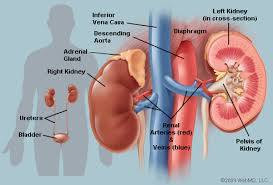Ageing and Kidney Function: How to Manage Kidney Disease in the Elderly
Simply defined kidney disease is a condition where the
kidneys are damaged and cannot filter waste products and excess fluids from the
blood effectively. There are various kidney illnesses, some of which are more
prevalent in the elderly. More than 50% of adults over the age of 70 have
chronic kidney disease (CKD), one of the most common kidney disorders in the
elderly. If CKD is not treated, it can worsen and eventually cause renal
failure, making dialysis or a kidney transplant necessary. Nephrotic syndrome,
glomerulonephritis, and acute kidney injury (AKI) are other prevalent kidney
conditions affecting the elderly.
CKD- CKD is a common kidney disease in the elderly, as
previously stated. It can take years for symptoms to appear due to the
condition's progressive nature. CKD is described by a continuous decrease in
kidney capability, and it tends to be brought about by a few elements,
including hypertension, diabetes, and cardiovascular illness. Acute kidney
injury (AKI) is one more typical kidney disease in the old, and it can be
brought about by a few elements, including dehydration, infections, and
medication side effects. AKI is a severe and sudden loss of kidney function
that necessitates prompt medical attention.
, high cholesterol levels,
and the presence of protein in the urine. Diabetes, lupus, and certain
medications are among the many factors that can result in nephrotic syndrome.
When an elderly person has kidney disease, the symptoms can
be subtle and nonspecific, making early diagnosis challenging. Elderly people
with renal disease frequently experience weariness, weakness, appetite loss,
nausea, and oedema in their legs and feet. Additional symptoms, such as high
blood pressure, anaemia, and bone disease, could develop as the condition
worsens. Doctors may do a number of tests, including blood, urine, imaging, and
kidney biopsy, to detect renal disease in the elderly.
Urinary tract infections: These infections can spread to the kidneys and cause kidney damage in the elderly.
Managing kidney disease in the elderly
Elderly kidney disease can be controlled with a mix of lifestyle changes, medication, and medical procedures. The treatment plan will be determined by the condition's severity and underlying cause. A nutritious diet, drinking enough water, and engaging in regular exercise can all assist to enhance kidney function and stop additional damage. The course of kidney disease can be slowed down by medications like angiotensin-converting enzyme (ACE) inhibitors and angiotensin receptor blockers (ARBs), which can help regulate blood pressure. Dialysis or a kidney transplant may be required in extreme circumstances.
i) Lifestyle
changes to improve kidney function- Making lifestyle changes can play a crucial
role in managing kidney disease in the elderly, says kidney experts at the
Hiranandani Hospital. Some of the lifestyle changes that can help improve
kidney function include maintaining a healthy diet, staying hydrated,
exercising regularly, and quitting smoking. A healthy diet for people with
kidney disease should be low in salt, phosphorus, and potassium, and high in
protein. Staying hydrated is also essential for kidney health, as it helps the
kidneys flush out waste products and excess fluids from the body. Drinking
enough water can also help prevent dehydration, which can cause kidney damage.
Regular exercise can also help improve kidney function by reducing blood
pressure and promoting overall health. Quitting smoking can also help improve
kidney function, as smoking can damage blood vessels and decrease blood flow to
the kidneys.
ii)
Medications for kidney disease in the elderly- Medications can be prescribed to
people with kidney disease to control blood pressure, lower cholesterol levels,
and manage other health conditions. ACE inhibitors and ARBs are commonly
prescribed to people with kidney disease, as they can help control blood
pressure and slow down the progression of kidney disease. Other medications
that can be prescribed include diuretics, which help the body get rid of excess
fluids, and phosphate binders, which help control phosphorus levels in the
blood.
iii) Dialysis
and kidney transplant options for the elderly- In serious cases of kidney disease,
dialysis or kidney transplant may become essential. When the kidneys are unable
to function properly, a medical procedure known as dialysis assists in the
removal of excess fluids and waste products from the body. Dialysis is one of
two types: peritoneal and hemodialysis treatments. Peritoneal dialysis uses the
lining of the abdomen to filter the blood, whereas hemodialysis uses a machine
to filter the blood outside the body.
For those with severe kidney disease, a kidney transplant is
another option. A kidney transplant is when a healthy kidney from a donor is
used to replace a diseased kidney. A major surgery called a kidney transplant
necessitates lifelong medication to stop the body from rejecting the new
kidney. Nonetheless, it can fundamentally improve the quality of life and
satisfaction of individuals with kidney infections.
.png)


Comments
Post a Comment